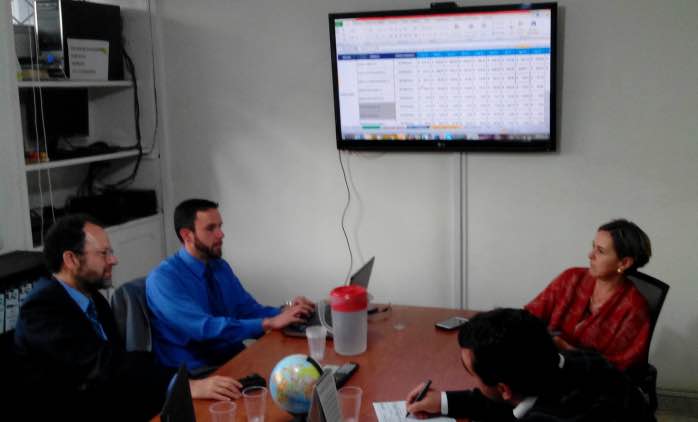Fostering High Growth in Colombian SMEs through Individualized and Group Consulting
In This Image A photo of a business training held in Colombia. © 2015 IPA
Abstract
Differences in management quality are an important contributor to productivity differences across countries. A key question is how best to improve poor management in developing countries. This evaluation tested two different approaches aimed at improving management in Colombian auto parts firms. The first was an intensive and expensive one-on-one consulting, while the second provided consulting to small groups of firms at approximately one-third of the cost of the individual approach. Both approaches led to improvements in management practices of a similar magnitude (8–10 percentage points) and there was some evidence the group-based approach increased firm size. The results suggest group-based consulting may be a scalable way to improve scaling up management practices.
Policy Issue
Differences in managerial quality appear to be critical to explaining productivity differences across firms, with poorly managed firms potentially unable to take advantage of opportunities for high growth. A previous study in India had shown that providing management consulting services to textile firms had raised productivity by 17 percent in the first year. The high cost of consulting services is a likely barrier to participation for both SMEs and governments in broader policy initiatives. Evidence on the effects of cost-effective consulting services could inform future programs aimed at improving management.
Context of the Evaluation
Colombia’s manufacturing sector accounted for 13 percent of GDP in 2014, making it an important source of jobs and income for millions of Colombians. Auto parts manufacturing, in particular, represents a strategic industry, given the country’s growing middle class and automotive market—which as of 2012 was South America’s third largest. Small and medium size auto parts manufacturers supply the local operations of global carmakers, such as Renault and General Motors. According to a survey conducted in 2013, however, Colombian manufacturers exhibited managerial capabilities comparable to lower-middle income countries, ranking between India and Kenya. This begs the question of whether poor managerial capacity has become a constraint for Colombian SMEs.
For this evaluation, the government of Colombia selected 159 small and medium-size auto parts firms to test whether poor management impeded SME growth, and whether management consulting could help overcome this challenge. The Government of Colombia was interested to learn if such an intervention would work on a larger scale, and whether a more cost-effective approach than individualized consulting could be developed.
Details of the Intervention
This evaluation measured the impact of two approaches with 159 small and medium-sized auto parts manufacturers on management practices and firm outcomes. In the first phase, a team of six consultants (five area specialists, and one team leader) conducted a detailed diagnostic of five different areas (Logistics, Human Resources, Finance, Marketing and Sales, and Production) for all firms in the sample. Then, some firms were randomly selected to receive individualized consulting, group consulting, or to the control group.
Firms receiving individual consulting had 500 hours of training over 6 months to identify areas for improvement and to implement targeted solutions. Firms participating in group consulting in groups of 3 to 8 firms received 408 hours of training over 6 months to provide consulting services at lower cost by leveraging group-learning dynamics. Consulting services for the group program were postponed by one year due to budgetary delays.
Results and Policy Lessons
Eighty-seven percent of firms completed the individual consulting services and 68 percent of firms completed the group consulting services. Both approaches lead to improvements in management practices of between 8 and 10 percentage points compared to the control group. Compared to the control group, firms receiving the group consulting had an increase in employment by 12 percent and no measurable impact on sales, while individual consulting had no measurable impact on employment or sales.
Management practices
Both the individual and group consulting saw improvements in management practices of between 8 and 10 percentage points compared to the control group. This improvement in management persists for the following year for both groups. Across both treatment groups, the management practices with the largest impacts were defining strategic goals and objectives, setting up master budgets, and monitoring key performance indicators. The smallest number of improvements are seen in human resource practices and logistics practices.
Firm Outcomes
Firms receiving the group consulting had a 12 percent increase in employment on average compared to the control group, while individual consulting had no measurable impact on firm outcomes compared to the control group. Neither group had a measurable impact on sales compared to the control group.
Cost-benefit
Group consulting was had a larger benefit for the cost than individual consulting. The group treatment cost US$10,500 per firm compared to US$28,950 per firm for the individual treatment. It was difficult to measure whether the group consulting would pay for itself, given the uncertainty associated with the sales impact and that the study lacks firm profitability data over time.
Policies looking to expand management support cost-effectively could consider group consulting if there is sufficient budget and capacity to deliver the services.













